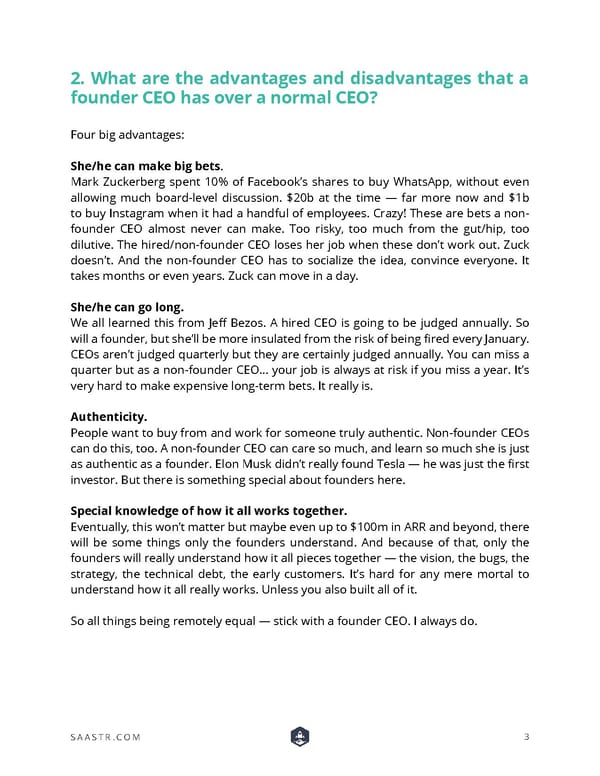2. What are the advantages and disadvantages that a founder CEO has over a normal CEO? Four big advantages: She/he can make big bets. Mark Zuckerberg spent 10% of Facebook’s shares to buy WhatsApp, without even allowing much board-level discussion. $20b at the time — far more now and $1b to buy Instagram when it had a handful of employees. Crazy! These are bets a non- founder CEO almost never can make. Too risky, too much from the gut/hip, too dilutive. The hired/non-founder CEO loses her job when these don’t work out. Zuck doesn’t. And the non-founder CEO has to socialize the idea, convince everyone. It takes months or even years. Zuck can move in a day. She/he can go long. We all learned this from Jeff Bezos. A hired CEO is going to be judged annually. So will a founder, but she’ll be more insulated from the risk of being fired every January. CEOs aren’t judged quarterly but they are certainly judged annually. You can miss a quarter but as a non-founder CEO… your job is always at risk if you miss a year. It’s very hard to make expensive long-term bets. It really is. Authenticity. People want to buy from and work for someone truly authentic. Non-founder CEOs can do this, too. A non-founder CEO can care so much, and learn so much she is just as authentic as a founder. Elon Musk didn’t really found Tesla — he was just the first investor. But there is something special about founders here. Special knowledge of how it all works together. Eventually, this won’t matter but maybe even up to $100m in ARR and beyond, there will be some things only the founders understand. And because of that, only the founders will really understand how it all pieces together — the vision, the bugs, the strategy, the technical debt, the early customers. It’s hard for any mere mortal to understand how it all really works. Unless you also built all of it. So all things being remotely equal — stick with a founder CEO. I always do. SAASTR.COM 3
 The Ultimate Guide For Scaling Sales & Raising Capital Page 6 Page 8
The Ultimate Guide For Scaling Sales & Raising Capital Page 6 Page 8